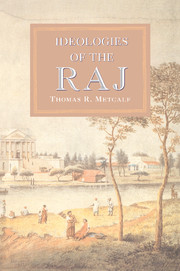2 - Liberalism and empire
Published online by Cambridge University Press: 28 March 2008
Summary
THE AGE OF REFORM
With the coming of Lord William Bentinck as Governor-General in 1828, the British avowedly embarked upon a thorough-going programme of reform. Building upon what had previously been little more than a vague expectation that somehow British rule ought to bring ‘improvement’ to India, free traders, utilitarians, and evangelicals created a distinctive ideology of imperial governance shaped by the ideals of liberalism. From Bentinck’s time to that of Lord Dalhousie (1848–56) this reformist sentiment gained a near universal ascendancy among the British in India.
A product of the industrial revolution and the growth of a new morality, as well as of Britain’s worldwide predominance after the Napoleonic wars, liberalism was in no way simply a vision of how empire ought to be organized. Informed by the thought of Adam Smith and Jeremy Bentham, it provided a strategy for the remaking of Britain itself. A host of legislative enactments, from the Reform Bill of 1832 through the New Poor Law, the repeal of the Corn Laws and the creation of the administrative state, mark out its progress through British society. Liberalism was, to be sure, in no sense a coherent doctrine. Indeed, as Richard Bellamy has pointed out, it is a ‘notoriously elusive notion’, extremely difficult to circumscribe and to define accurately. It incorporated a variety of heterogeneous views and evolved piecemeal over a long period of social upheaval. As a result, within early Victorian England there existed liberals of many kinds. One can identify as liberals, among others, men of such diverse political views as aristocratic Whigs, classical political economists, Tory Peelites committed to economic reform, radicals, and Benthamite utilitarians. The distance separating, say, the radical John Bright from the Whig Lord Palmerston was immense. And there was, of course, no organized Liberal Party until the rise of William Gladstone in the 1860s.
- Type
- Chapter
- Information
- Ideologies of the Raj , pp. 28 - 65Publisher: Cambridge University PressPrint publication year: 1995
References
- 1
- Cited by



